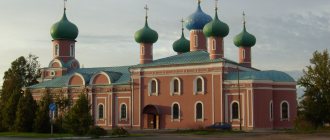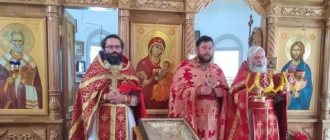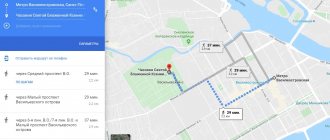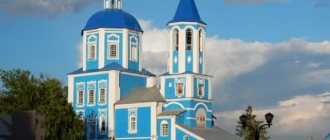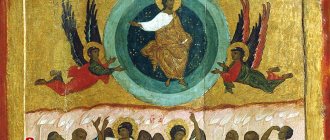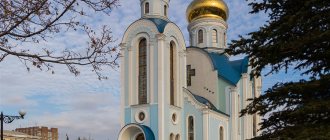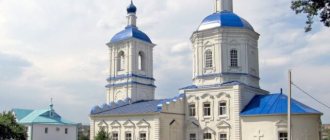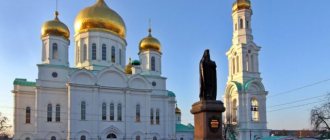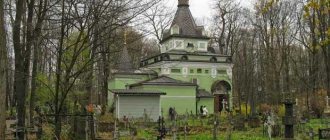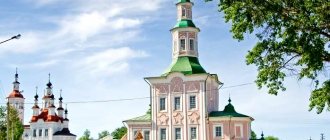| St. Petersburg Diocese | |
| Kazan Cathedral | |
| A country | Russia |
| Church | Russian Orthodox Church |
| Metropolis | St. Petersburg |
| Date of foundation | 1742 |
| Control | |
| Main city | Saint Petersburg |
| Cathedral | Kazan Cathedral |
| Hierarch | Metropolitan of St. Petersburg and Ladoga Barsanuphius (Sudakov) (since March 19, 2014) |
| Suffragan bishops | Nazariy (Lavrinenko), Bishop of Kronstadt Silouan (Nikitin), Bishop of Peterhof |
| Statistics | |
| Deanery | 18 (territorial) and 4 (special) |
| Temples | 235 parishes, 126 ascribed churches; 103 chapels; 6 prayer rooms; 4 monasteries (as of December 25, 2015) |
| Square | 85,910 km² (2012) |
| Population | 6,683,427 (2012) |
| Map | |
| www.mitropolia-spb.ru | |
| Media files on Wikimedia Commons | |
The St. Petersburg diocese
is a diocese of the Russian Orthodox Church, on the territory of the city of St. Petersburg and the cities of Novaya Ladoga and Staraya Ladoga, Volkhov district, Leningrad region.
Established on September 1 (12), 1742. During the synodal period it was the first diocese of the Russian Orthodox Church in terms of seniority and honor. Since March 12, 2013, it has been part of the St. Petersburg Metropolis
Content
- 1 History 1.1 Ruling bishops and their titles
- 2.1 Existing
- 3.1 Diocesan administration
- 4.1 Active monasteries 4.1.1 Admiralteysky district
- 4.2.1 Central region
St. Petersburg and Tver diocese
Supervising bishop : Metropolitan of Moscow and All Russia Korniliy (Titov), since 2005.
Cathedral Church : there is no final decision on the purpose of the temple, it was assumed that it would be the temple of the Ligovskaya community of St. Petersburg.
Address of the diocese : St. Petersburg, Transportny lane. house 5. Secretary of the diocese : Priest Igor Karvanen, rector of the Ligovskaya community. Phone number of the diocese housekeeper (Pokrovskaya community of St. Petersburg).
— Icon of the St. Petersburg diocese and dean of the St. Petersburg and Novgorod deanery: Archpriest Gennady Chunin . — Dean of the Klintsov and Gomel deaneries: Priest Sergius Bedny . — Dean of the Tver and Smolensk deaneries: Archpriest Evgeny Chunin .
Territory : Leningrad, Novgorod, Pskov regions and the Republic of Karelia.
Parishes and communities:
· St. Petersburg - Pokrovskaya community and the Church of the Intercession of the Virgin Mary (archpriest Gennady Chunin)
· St. Petersburg Ligovskaya community and St. Trinity (Fr. Igor Karvanen)
· St. Petersburg Gromovskaya community and home church of St. Peter the Metropolitan (temporary without care)
· Veliky Novgorod - community of the Church of St. John the Theologian (Fr. Alexander Pankratov) The community is not large.
· Veliky Novgorod - St. prophet Elijah (without a community; run by Father Alexander P.)
· Novgorod region village. Malaya Vishera - Community and Church of the Assumption of the Most Holy. B. (cared for by Father Igor Karvanen). The community is extremely small.
· Novgorod region, village of Aleshonka – Church of the Presentation of the Most Holy. B. (cared for by Father Alexander Pankratov). There is no community. One elderly caregiver.
· Pskov A place has been allocated for construction (caring is entrusted to Father Alexey Legostaev). There is no community. A decision on closure was expected)
· Pskov region, village of Korhovo; temple of st. Nikola (cared for by Father Igor Karvanen) The community is small.
· Petrozavodsk Karelia, construction of a church has begun (father Gennady Chunin takes care of it) The community is not large.
· Baltic states (?) – according to our decisions, it is included in the St. Petersburg diocese, and according to the decisions of the Bravilov Metropolis, they consider it theirs. At the moment, Fr. is also visiting the Baltic states. Gennady, and there is a parish there near Riga, which is subordinate to Metropolitan Leonty Belokrinitsky
Tver and Smolensk deanery. Dean - Archpriest Evgeniy Chunin
Territory of the Tver and Smolensk regions.
Parishes and communities:
· Tver preparation for the construction of a temple in the name of St. Blessed. Princess Anna Kashinskaya. Since 2022 - a temporary temple in the name of the Exaltation of the Holy Cross, priest Fr. Alexey Legostaev, acting rector - Rev. Evgeny Chunin)
· Tver region Rzhev Church of the Intercession Ave. B. (rector Archpriest Evgeny Chunin, Priest Andrei Andreev, Protodeacon John Chunin)
· Tver region Rzhev - Trinity community - the skeleton of a bell tower without a temple. (while remaining without feeding)
· Tver region Rzhevsky district. Malomakhovo village (territory of the Rzhev Monastery) Chapel with a marching altar in the name of St. Martyr. Flora and Lavra, served by clergy of the Intercession Church in Rzhev
· Smolensk region Sychevka – community and temple of St. Sergius of Radonezh (rector Priest Dimitri Chunin).
· Smolensk, no church. The community has been fighting for many years to obtain a site for the construction of a church (father Andrei Andreev is entrusted with care).
· The issue of opening a community and building a church in the city of Vyazma, Smolensk region is being resolved.
· The issue of opening a community and building a church in the city of Konakovo, where there used to be a parish founded by Matvey Sidorovich Kuznetsov, is being resolved.
Bryansk Deanery Dean - Priest Sergius Bedny
Territory of Bryansk region.
Parishes and communities:
· Bryansk region Klintsy - community and temple of the Transfiguration of the Lord and the Presentation of St. B. (Fr. Mikhail Smirnov)
· Bryansk region Novozybkov - community and Church of the Nativity Ave. B. and St. St. Nicholas (Fr. Sergius the Poor), wooden church from Catherine’s times. The community is not large.
· Bryansk region village Zlynka Community is completing the construction of the temple, consecration is planned (Fr. Dimitry Voronovsky)
· The issue of opening a community and building a church in Bryansk is being resolved (Fr. Sergius Bedny)
History[ | ]
Historically, the territory in church-canonical terms was under the jurisdiction of the bishops of Novgorod - until the beginning of the 18th century.
Upon the founding of St. Petersburg, before the establishment of a separate diocese, there existed the St. Petersburg Synodal Region, governed by the Holy Synod through specially appointed persons. The “Tiunskaya Izba” (office) located under the Holy Synod was in charge of the small territory of “Ingermanland” under the name of the Synodal Region.”
The diocese was established on September 1 (12), 1742 under the Archbishop of Velikonovgorod and Velikolutsk Ambrose (Yushkevich) (1740-1745) - under the administration of Bishop Niim (Srebnitsky).
After January 1 (12), 1775 and until October 18 (30), 1892, the territory was usually governed together with the Velikonovgorod diocese: the ruling bishop after June 25 (July 7), 1818 was usually titled “Novgorod, St. Petersburg, Estland and Finland, Holy Trinity Alexander Nevsky Lavra, sacred archimandrite.” Since 1865, due to the annexation of the Estonian province to the Riga diocese, the title was shortened by omitting the word “Estonian”.
In the summer of 1923, out of 123 Petrograd churches, 113 were under the jurisdiction of the “renovationist” diocese[1] under the control of the renovationist Metropolitan of Petrograd Artemy (Ilyinsky). In October of the same year, upon the arrival of the newly appointed “Old Church” Bishop Manuel (Lemeshevsky) in Petrograd, the relationship between the two opposing “orientations” changed significantly in favor of the “Old Church”, although the positions of the “Renovationists” in Leningrad remained very strong until 1943.
At the end of December 1927, due to the rejection of the “Declaration” of Metropolitan Sergius (Stragorodsky) by a significant part of the “Old Church”, as well as due to dissatisfaction with the removal from the Leningrad see of the previously appointed ruling bishop, Metropolitan Joseph (Petrovykh), a significant part of the diocese, led by the vicar Bishop Dimitri (Lyubimov) announced “On the break with Metropolitan Sergius” (Act of December 26, 1927, handed to Bishop Nikolai (Yarushevich)), after which Vicar Nikolai (Yarushevich) was appointed temporary administrator of the diocese. At the end of February 1928, Metropolitan Sergius appointed Metropolitan Seraphim (Chichagov) to the Leningrad See, who, with the assistance of Bishop Manuel (Lemeshevsky), who arrived in the spring of the same year, managed to stabilize the situation in the diocese.
By the beginning of World War II (September 1, 1939), the Leningrad diocese, along with the Moscow diocese, remained one of two dioceses of the Moscow Patriarchate within the USSR that retained a ruling bishop. The number of active parishes in it has decreased to one and a half dozen. If at the beginning of 1937, on the eve of the Great Terror, 249 parishes of the Moscow Patriarchate operated in the modern territory of the Leningrad region[2], then by the summer of 1941 there were 16 churches functioning there. The possibility of reviving churches was widely realized by believers in the occupied areas of the region, from August 1941 to the fall of 1943.
On March 12, 2013, the Vyborg, Gatchina and Tikhvin dioceses were separated from the territory of the diocese, which (together with St. Petersburg) became part of the newly formed St. Petersburg Metropolitanate[3].
Ruling bishops and their titles[ | ]
Main article: Metropolitan of St. Petersburg and Ladoga
Russian Orthodox Church
Part of the St. Petersburg Metropolitanate
Before the establishment of the diocese in 1742, there was the St. Petersburg Synodal Region, which included some parts of the Novgorod and Karelian dioceses and the territory conquered from the Swedes. At the end of the 17th - beginning of the 18th centuries. the territory of the future diocese was under the jurisdiction of the Novgorod and Pskov bishops. Part of Ingermanland (Synodal Region) was under the jurisdiction of the Holy Synod.
The St. Petersburg diocese was established on September 1 (12), 1742. Since 1745 it has been an archdiocese. January 1 (12), 1775 merged with the Novgorod diocese. October 16 (27), 1799 The Novgorod diocese was separated from St. Petersburg. From December 19 (31), 1801, the St. Petersburg bishop was ordered to be called “and Novgorod”. On March 26 (April 7), 1818, Novgorod was again separated from the diocese. Three months later, Novgorod was returned to the jurisdiction of the St. Petersburg Metropolitan. In 1865, the parishes of the Estonian province were separated from the diocese. From October 18 (30), 1892, the department began to be called St. Petersburg and Ladoga.
By the decision of the Holy Synod of March 16, 2012 (journal No. 19), the Lodeynopolsky Vicariate was formed within the Lodeynopolsky and Podporozhye deaneries of the St. Petersburg diocese.
By the decision of the Holy Synod of March 12, 2013 (journal No. 16), the Vyborg, Gatchina and Tikhvin dioceses were separated from the diocese. The St. Petersburg diocese is included in the St. Petersburg Metropolis.
Diocese today (as of January 1, 2022)
Deaneries and deaneries
- Admiralteyskoe - Archpriest Pavel Feer
- Vasileostrovskoe - Archpriest Viktor Moskovsky
- Vyborg - Archpriest Alexander Budnikov
- Kalinin district, social deanery - Archpriest Nikolai Bryndin
- Kirov District - Archpriest Valery Dorokhov
- Kolpino District - Archpriest Alexander Selivanov
- Krasnogvardeyskoe, deanery of churches in universities - Archpriest Pyotr Mukhin
- Krasnoselsky district - Archpriest Mikhail Podoley
- Kronstadt district, military deanery - Archimandrite Alexy (Ganzhin)
- Resort District - Archpriest Vyacheslav Nikitin
- Moscow district - Archpriest Alexy Krylov
- Nevsky District - Archpriest Alexy Sklyarov
- Petrograd district - Archpriest Vladimir Sorokin
- Petrodvorets District - Archpriest Mikhail Teryushov
- Primorsky district - Archpriest Ippolit Kovalsky
- Pushkin District - Archpriest Gennady Zverev
- Frunzensky district - Archpriest Alexy Isaev
- Central District - Archpriest Sergiy Kuksevich
- Deanery of the monasteries - Bishop Nazariy of Kronstadt
- Deanery of prison churches - Archpriest Oleg Skomorokh
Temples not included in the deanery:
- Kazan Cathedral;
- RO "The Bishop's Compound of the Church of the Annunciation of the Blessed Virgin Mary in St. Petersburg of the St. Petersburg Diocese of the Russian Orthodox Church (Moscow Patriarchate)";
- RO "The Bishop's Compound of the Church of the Holy Trinity on Oktyabrskaya Embankment in St. Petersburg of the St. Petersburg Diocese of the Russian Orthodox Church (Moscow Patriarchate)";
- temple in honor of St. blgv. led book Alexander Nevsky in the Constitutional Court of the Russian Federation;
- Church of the Holy Fathers of the Seven Ecumenical Councils in the Synod building;
- temple in honor of St. ap. and Evangelist John the Theologian at the St. Petersburg Theological Academy;
- Church in honor of the Dormition of the Blessed Virgin Mary at the St. Petersburg Theological Academy;
- Church of the Twelve Apostles of St. Petersburg Theological Academy;
- Church of Seraphim (Chichagov) at the Diocesan courses of religious education.
Monasteries
men's:
- Alexander Nevsky Lavra 191167, St. Petersburg, river embankment. Monastyrki, 1; tel. (reception, office); fax (reception), 710-20-40 (press service); e-mail (reception), [email protected] (office), (press service); website lavra.spb.ru rector - Metropolitan of St. Petersburg and Ladoga Barsanuphius; vicar - Bishop Nazariy of Kronstadt
- Trinity-Sergiev Primorskaya Hermitage 198515, St. Petersburg, Strelna, Petersburg highway, 15; tel. (passage), 647-07-45 (bookstore); e-mail; website pustin.spb.ru rector - Archimandrite Nikolai (Paramonov)
women's:
- Voskresensky Novodevichy 196084, St. Petersburg, Moskovsky Avenue, 100; tel. (812) 252-11-66 (office), (pilgrim’s house); (812) 369-30-98 (monastery shop), (publishing house); e-mail; website www.novodev.spb.ru abbess - Abbess Sofia (Silina)
- Konstantino-Eleninsky 188839, Leningrad region, Vyborg district, village. Leninskoye, st. Sovetskaya, 44; tel., 343-67-89; email konst [email protected] abbess - abbess Hilarion (Feoktistova)
The total number of farmsteads is 3, hermitages are 1.
There are 257 parishes, 189 assigned churches (including those under construction), 26 monastery churches, 86 chapels, 15 prayer rooms.
There are four bishops serving in the diocese, one is a retired bishop. There are 782 full-time clergy, including:
- priests - 607
- deacons - 175.
Educational establishments
- St. Petersburg Orthodox Theological Academy and Seminary 191167, St. Petersburg, Obvodny Canal embankment, 17; tel (rector), 717-33-51 (office), 717-86-63 (assistant to the vice-rector on duty), 717-32-62 (vice-rector for academic affairs), 717-86-08 (secretary of the council); fax, 717-86-07; e-mail; website spbda.ru
- Russian Christian Humanitarian Academy 191023, St. Petersburg, Fontanka River embankment, 15; tel. (812) 314-35-21 (admissions committee); Fax; email [email protected] ; website rhga.ru
Diocesan media
- Official website of the St. Petersburg Metropolitanate https://mitropolia.spb.ru
- Diocesan magazine “Living Water. St. Petersburg Church Bulletin" https://aquaviva.ru
- Diocesan radio station “Grad Petrov” https://grad-petrov.ru
- TV project “Slovo” on the TV channel “St. Petersburg” https://www.slovotv.ru
- website of the diocesan department for prison ministry https://ots-spb.cerkov.ru
***
Report by Metropolitan Barsanuphius of St. Petersburg and Ladoga at the diocesan meeting of the St. Petersburg diocese on December 15, 2014.
Report by Metropolitan Barsanuphius of St. Petersburg and Ladoga at the diocesan meeting of the St. Petersburg diocese on December 12, 2017.
Feodorovsky Cathedral in St. Petersburg
Church of the Assumption of the Blessed Virgin Mary of the St. Petersburg Metochion of Optina Hermitage
Vicariates[ | ]
Existing[ | ]
- Kronstadt
- Peterhofskoye
Abolished[ | ]
- Vyborg (since March 12, 2013 an independent diocese)
- Gatchina (since March 12, 2013 an independent diocese)
- Gdovskoe (now a vicariate of the Pskov diocese)
- Kingiseppskoye (formerly Yamburgskoye; titular city on the territory of the Gatchina diocese)
- Kolpinskoe
- Koporskoye (titular city on the territory of the Gatchina diocese)
- Ladoga (titular city on the territory of the Tikhvin diocese)
- Lodeynopolskoye (titular city on the territory of the Tikhvin diocese)
- Luzhskoye (titular city on the territory of the Gatchina diocese)
- Narva (now an independent diocese)
- Okhtinskoe (edinoverticheskoe)
- Revelskoe (now an independent Tallinn diocese)
- Sestroretskoe
- Starorusskoe (titular city on the territory of the Novgorod diocese)
- Tikhvinskoe (since March 12, 2013 an independent diocese)
- Tsarskoselskoye
- Shlisselburgskoye (titular city on the territory of the Tikhvin diocese)
Current status[ | ]
Diocesan Administration[ | ]
The ruling bishop since March 19, 2014 is Metropolitan of St. Petersburg and Ladoga Barsanuphius (Sudakov).
Territory, number of parishes[ | ]
As of January 1, 2014, the number of parishes registered with the Department of Justice was 195; monasteries - 4 (2 - male, 2 - female).
Attractions[ | ]
On the territory of St. Petersburg there is the Alexander Nevsky Lavra.
Educational institutions[ | ]
- Alexander Nevsky Theological School
- St. Petersburg Theological Academy
Media[ | ]
The metropolis has its own radio station, “Grad Petrov,” and the official magazine of the St. Petersburg diocese, “Living Water.” In addition, there is an online resource “Metropolitan Globe”, which maintains up-to-date information about churches and clergy of the diocese.
Bishops
- Nikodim (Skrebnitsky) (September 1, 1742 - February 2, 1745) [11]
- Theodosius (Yankovsky) (March 10, 1745 - April 22, 1750)
- Sylvester (Kulyabka) (April 25, 1750 - April 17, 1761) [12]
- Veniamin (Putsek-Grigorovich) (September 15, 1761 - July 25, 1762)
- Gabriel (Kremenetsky) (July 25, 1762 - September 22, 1770)
- Gabriel (Petrov-Shaposhnikov) (September 22, 1770 - October 16, 1799) [13]
- Ambrose (Podobedov) (October 16, 1799 - March 26, 1818)
- Mikhail (Desnitsky) (March 26, 1818 - March 24, 1821)
- Seraphim (Glagolevsky) (March 26, 1821 - January 17, 1843)
- Nikanor (Klementyevsky) (? - August 1826) v/u, ep. Revelsky
- Nikanor (Klementyevsky) (November 4 - November 20, 1848) v/u, archbishop. Novgorod
- Platon (Thebean) (September 17 - October 1, 1856) v/u, bishop. Revelsky
- Leonty (Lebedinsky) (June - July 1, 1860) v/u, bishop. Revelsky
- Anthony (Vadkovsky) (September 7, 1892 - October 18, 1892) v/u, bishop. Vyborgsky [14]
- John (Kratirov) (October 3 - December 25, 1898) v/u, bishop. Narvsky
- Nikandr (Fenomenov) (May 26 - September 26, 1910) v/u, ep. Narvsky [15]
- Nikandr (Phenomenov) (1912 - September 26/October 9, 1912) v/u, ep. Narvsky
- Nikandr (Phenomenov) (November 2 - 23, 1912) v/u, ep. Narvsky
- sschmch. Veniamin (Kazansky) (June 12, 1914 - July 25, 1914) v/u, bishop. Gdovsky
- sschmch. Veniamin (Kazansky) (March 6 - May 25, 1917) high school bishop. Gdovsky
- Alexy (Simansky) (May 29, 1922 - 1922) high school bishop. Yamburgsky [16]
- Gury (Stepanov) (July 1923 - July(?) 1923) high school, bishop. Alatyrsky [18]
- Manuil (Lemeshevsky) (September 23, 1923 - February 15, 1924) v/u, bishop. Luzhsky
- Venedikt (Plotnikov) (February 1924 - December 18, 1925) v/u, bishop. Kronstadt
- Gabriel (Voevodin) (September 14, 1926 - April 19, 1927) v/u, bishop. Kingisepsky (Yamburgsky)
- Nikolai (Yarushevich) (September 17, 1927 - February 1928) deputy. v/u, ep. Peterhofsky [19]
- Grigory (Chukov) (May 26, 1944 - September 7, 1945) v/u, archbishop. Pskovsky
- Anthony (Melnikov) (September - October 10, 1978) supreme, Metropolitan. Minsky
- Alexy (Ridiger) (June 10 - July 20, 1990) v/u, Patriarch of Moscow and All Rus'
- Simon (Gethea) (November 3 - December 27, 1995) v/u, ep. Tikhvinsky
Monasteries of St. Petersburg[ | ]
Active monasteries[ | ]
Admiralteysky district[ | ]
- courtyard of the Valaam monastery
- courtyard of the Konstantino-Eleninsky monastery
Vasileostrovsky district[ | ]
- Metochion of Kozelskaya St. Vvedenskaya Optina Hermitage
Vyborg district[ | ]
- metochion of the Vvedeno-Oyatsky convent
Kalininsky district[ | ]
- Metochion of the Holy Trinity St. Anthony of Siysk Monastery of the Arkhangelsk Diocese
Kirovsky district[ | ]
- Metochion of the Intercession-Tervenichesky Women's Monastery
Moskovsky district[ | ]
- Resurrection Novodevichy Convent
Nevsky district[ | ]
- Metochion of Alexander Svirsky Monastery
- metochion of the Holy Trinity Zelenetsky Monastery
Petrogradsky district[ | ]
- Ioannovsky Convent
Petrodvortsovy district[ | ]
- Sergiev Primorskaya Hermitage
Frunzensky district[ | ]
- Metochion of the Antoniyevo-Dymsky Monastery
Central region[ | ]
- Alexander Nevsky Lavra
- courtyard of the Konevsky Monastery
- metochion of the Old Athos St. Andrew's monastery
- courtyard of the Tikhvin Monastery
Inactive monasteries[ | ]
Central region[ | ]
- Smolny Monastery
Deanery districts of the diocese[ | ]
| Check information. It is necessary to check the accuracy of the facts and reliability of the information presented in this article. There should be an explanation on the talk page. |
As of 2022, the territory of St. Petersburg was divided into 18 territorial deanery districts[4], in addition, another district was created on the territory of the Leningrad region. Six special deaneries have been established in the diocese: the deanery of churches in higher educational institutions; military deanery, including churches at military and law enforcement institutions in St. Petersburg and the Leningrad region; deanery of churches, chapels and prayer rooms located in medical and social institutions; ritual deanery; deanery of prison churches, chapels and prayer rooms in places of forced detention and deanery of monasteries and monastic farmsteads).
| List of deanery districts of the diocese | ||||
| Name | Dean | Central Temple | Territory | Date of foundation |
| Saint Petersburg | ||||
| Admiralteysky | Archpriest Pavel Feer | Church of the Epiphany on Gutuevsky Island | Admiralteysky district | |
| Vasileostrovsky | Archpriest Evgeny Shogenov | Church of the Smolensk Icon of the Mother of God | Vasileostrovsky district | January 5, 2015[5] |
| Vyborg | Archpriest Alexander Budnikov | Church of the Holy Prophet Elijah on Porokhov | Vyborgsky district of St. Petersburg | January 5, 2015[6] |
| Kalininsky | Archpriest Nikolai Bryndin[7] | Transfiguration Cathedral | Kalininsky district of St. Petersburg | January 5, 2015[6] |
| Kirovsky | Archpriest Valery Dorokhov | Kazan Church at the Red Cemetery | Kirovsky district of St. Petersburg | January 5, 2015[8] |
| Kolpinsky | Archpriest Alexander Selivanov | Holy Trinity Cathedral in Kolpino | Kolpinsky district | September 9, 2014[9] |
| Krasnogvardeisky | Archpriest Peter Mukhin[7] | Peter and Paul Church at the St. Petersburg State Medical Academy named after Mechnikov | Krasnogvardeisky district of St. Petersburg | January 5, 2015[6] |
| Krasnoselsky | Archpriest Mikhail Podoley[10] | Church of St. Righteous John of Kronstadt | Krasnoselsky district | |
| Kronstadt | Archimandrite Alexy (Ganzhin)[7] | St. Nicholas Naval Stavropegic Cathedral of the city of Kronstadt | Kronstadt district of St. Petersburg | January 5, 2015[5] |
| Resort | Resort area | [11] | ||
| Moscow | Archpriest Alexy Krylov | Chesme Church | Moskovsky district of St. Petersburg | January 5, 2015[8] |
| Nevsky | Archpriest Alexy Sklyarov | Trinity Church "Kulich and Easter" | Nevsky district | |
| Peterhofsky | Archpriest Mikhail Teryushov | Peter and Paul Cathedral in Peterhof | Petrodvortsovy district | |
| Petrogradsky | Archpriest Vladimir Sorokin | Prince Vladimir Cathedral | Petrogradsky district | |
| Seaside | Hieromonk Alexander (Kovalsky) | Church of the Holy Martyr Tatiana on Kolomyazhsky Avenue | Primorsky district of St. Petersburg | |
| Frunzensky | Archpriest Alexy Isaev | Church of St. George the Victorious in Kupchin | Frunzensky district of St. Petersburg | January 5, 2015[8] |
| Tsarskoselsky | Archpriest Nikita Zverev | Catherine's Cathedral in Tsarskoe Selo | Pushkinsky district of St. Petersburg | 1998[12] (1780) |
| Central | Archpriest Sergiy Kuksevich | Church of the Resurrection of Christ (Savior on Spilled Blood) | Central district of St. Petersburg | |
| Novoladozhsky | Archpriest Alexy Volkov | Mother of God Nativity Cathedral in Novaya Ladoga | part of the Volkhov district of the Leningrad region | March 4, 2016 |
| Special | ||||
| Deanery of monasteries and monastic farmsteads | Bishop of Kronstadt Nazariy (Lavrinenko) | Alexander Nevsky Lavra | — | |
| Deanery of churches in higher educational institutions | Archpriest Peter Mukhin | Peter and Paul Church at the St. Petersburg State Medical Academy named after Mechnikov | — | |
| Ritual deanery | Priest Ilya Nefedov | Church of the Annunciation in Pargolovo | — | August 29, 2019 |
| Social decency | Archpriest Nikolai Bryndin | Transfiguration Cathedral | — | September 2014 |
| Prison deanery | Archpriest Oleg Skomorokh | Catherine's Church in Tsarskaya Slavyanka | — | |
| Military deanery | Archimandrite Alexy (Ganzhin) | St. Nicholas Naval Stavropegic Cathedral of the city of Kronstadt, Krasnoselsky Holy Trinity Garrison Church | — | |
Geography of deaneries
The diocese is limited to the city of St. Petersburg, which is divided into 23 deaneries. Of these, 18 are territorial:
- Admiralteyskoe
- Vasileostrovskoe
- Vyborgskoe
- Kalininskoe
- Kirovskoe
- Kolpinskoe
- Krasnogvardeiskoe
- Krasnoselskoe
- Kronstadt
- Resort
- Moskovskoe
- Nevskoe
- Petrogradskoe
- Petrodvortsovoye
- Primorskoye
- Pushkinskoe
- Frunzenskoe
- Central
There are also five specialized deaneries: Military, Higher Educational Institutions, Monastic, Social and Prison.
Units under the jurisdiction of the St. Petersburg diocese outside the deaneries[ | ]
- Diocesan administration
- Diocesan Council
- Protocol department
- Department of Religious Education and Catechesis
- Department for Cooperation with the Armed Forces and Law Enforcement Agencies
- Youth Affairs Department
- Department of Church Charity and Social Service
- Information department
- Publishing Council
- Financial and economic department
- Commission on Architectural and Artistic Issues
- Department for interaction with sports organizations
- Commission on Family Issues, Protection of Motherhood and Childhood
- Department for interaction with the Cossacks
- Prison Ministry Department
- Council for Culture
- Missionary department
- Commission for the Canonization of Saints
- Department for Church and Society Relations
- Communications Sector under the Diocesan Information Department
- Press service
- Orthodox initiative in St. Petersburg
- Orthodox missionary apologetic
- Crisis center of the St. Petersburg diocese[13].
Structure of the Department for Church Charity and Social Service of the St. Petersburg Diocese
:
- Coordination Center for Combating Drug Addiction and Alcoholism
- Coordination center for assistance to the homeless and people in difficult life situations
- Coordination Center for Work with Disabled People
- Coordination center for work with children without parental care
- Coordination center for work with volunteers and sisters of mercy
- Diocesan helpline
- Society of Orthodox Psychologists
- Social deanery of the St. Petersburg diocese[14]
Notes[ | ]
- Vladislav Tsypin. History of the Russian Church 1917-1997
Chapter II.
Russian Church under His Holiness Patriarch Tikhon (1917-1925) - Alexy (Simansky), Metropolitan of Leningrad
. Alphabetical list of the clergy of the Leningrad region on May 1, 1937. Publication by A. A. Bovkalo and A. K. Galkin. St. Petersburg: Prince Vladimir Cathedral, 2014. pp. 189-194 - Journals of the meeting of the Holy Synod of March 12, 2013
- New dean districts established
- ↑ 12
Separated from the Petrograd District. - ↑ 123
Formed as a result of the division of Bolsheokhtinsky Okrug. - ↑ 123
At the same time. - ↑ 123
Separated from the Nevsky District. - Separated from the Tsarskoye Selo district.
- Acting since March 7, 2015.
- Renamed on January 5, 2015, previously Sestroretskoye.
- Separated from the Peterhof deanery.
- List of institutions under the jurisdiction of the St. Petersburg diocese outside the deaneries
- Website of the Department for Church Charity and Social Service of the St. Petersburg Diocese (unspecified)
.
The most influential people in the St. Petersburg diocese - 2022
In 2022, the life of the top management of the St. Petersburg diocese was neither quiet nor patriarchal. On February 26, 2022, at a meeting of the Synod, Metropolitan Barsanuphius submitted a petition for his own release from the post of manager of the affairs of the Moscow Patriarchate, retaining his see in St. Petersburg. On the eve of this event, there was active discussion in church circles about where the patriarch would expel the metropolitan from - from the administration, from St. Petersburg, or from everywhere at once. That is, it was known about the clouds gathering over Barsanuphius’s head, although he did not give any visible reason for displeasure. Experts explained what happened simply because the patriarch had a desire to change places. At the same time as Barsanuphius, for example, the head of the financial and economic department of Ryazan, Metropolitan Mark, lost his post.
In addition, the previously monolithic ranks of the St. Petersburg episcopate have finally cracked, first shocked in 2022 by the departure of the rector of the St. Petersburg Theological Academy, Archbishop Ambrose, who went to a similar position in Moscow. He was not bored there: already this year, with the help of Ambrose, Kirill tried (unsuccessfully) to seize Sretensky Seminary, the brainchild of Metropolitan Tikhon, who, due to his KGB connections, is considered the main competitor of the patriarch. This story also directly affected St. Petersburg.
Bishop Seraphim, who replaced Ambrose last summer, was replaced this summer by Bishop Silouan. And in the spring, Bishop Markell of Tsarskoye Selo died. Thus, of the three experienced St. Petersburg vicars, only one abbot of the Lavra, Nazarius, remained.
Who is influential in the St. Petersburg diocese
1. Barsanuphius, Metropolitan of St. Petersburg and Ladoga (1)*
2. Nazarius, Bishop of Kronstadt (2)
3. Ignatius, Bishop of Vyborg and Priozersk (-)
4. Gennady Zverev, archpriest (3)
5. Sergiy Kuksevich, archpriest (5)
6. Silouan, Bishop of Peterhof (-)
7. Abbess Sofia (Silina) (9)
8. Pyotr Mukhin, archpriest (-)
9. Mercury, Metropolitan of Rostov and Novocherkassk (-)
10. Alexander Pelin, archpriest (-)
- The rating is based on an expert survey conducted by the magazine "City 812".
- * Places in the 2022 ranking
Metropolitan Barsanuphius remains in charge, but his position has been seriously shaken. Firstly, the loss of the post of actually the second person in the Patriarchate. But even more so - the speed and suddenness with which it happened. Because the question arises: if you can fall out of the manager’s chair so quickly, isn’t it just as quickly and unexpectedly possible to fly out of St. Petersburg? In addition, the position of Bishop Marcellus remains vacant. Who and when to occupy it is decided formally by the Synod, but in fact by the Patriarch. Will he just send someone to St. Petersburg, or will a person with ambitions appear here? And if the latter, where will the boundaries of these ambitions be?
Bishop Nazariy of Kronstadt is the last pillar of stability. This year he celebrated the 10th anniversary of his archbishop's ministry, and the Bishop has led the Alexander Nevsky Lavra longer than Putin has led Russia - since 1997. The Lavra itself is not only a spiritual, but also a major economic center. In general, from all sides, Bishop Nazariy is a respected person, especially given the lack of competitors.
Formally, Bishop Ignatius has no relation to the St. Petersburg diocese, since he heads the neighboring one, Vyborg. It, of course, is part of the St. Petersburg Metropolis, but the Metropolis is something like the CIS: nothing more than a sign on the door of its leader, Bishop Barsanuphius. Ignatius is a full-fledged ruling bishop, whose name was mentioned in February among potential contenders for the St. Petersburg see. He has a good biography: the bishop grew up spiritually practically in the hands of the patriarch. He began his career in the Smolensk diocese, which was then headed by Kirill. He tonsured him as a monk, ordained him a hieromonk, and then a bishop. Since then, Ignatius has always followed his boss, until in 2013 he was appointed to independently rule the Vyborg diocese, separated from St. Petersburg. Since there is no certainty that the issue of the resignation of Metropolitan Barsanuphius has been removed and not postponed, many are paying attention to Ignatius.
This year, Archpriest Gennady Zverev , who controls the Pushkinsky district and is considered a person with access to respected people in Moscow, added another asset to himself. He became rector of the Fedorov Sovereign Cathedral after its previous rector, Bishop Markell of Tsarskoye Selo, died. In the rich Tsarskoye Selo, therefore, there was only one owner left.
The secretary of the diocesan administration, Archpriest Sergiy Kuksevich, like Bishop Nazariy, is one of the pillars of church St. Petersburg. He has been in charge of the entire bureaucratic apparatus of the diocese since 2013 and not only controls the formal levers of control. Kuksevich knows many people and remembers a lot, and many remember him.
The new (appointed on July 9, 2022) rector of the St. Petersburg Theological Academy, Bishop Silouan, received the position along with the rank of general: at the same time he was ordained bishop from a hieromonk. Previous place of work – acting. rector of the Sretensky Theological Seminary, after Metropolitan Tikhon (Shevkunov) was removed from this post and sent to lead the Pskov diocese. Silouan, however, is considered Tikhon's man. It was by removing Tikhon and appointing acting. the rector of Sretenka Seminary, Archbishop Ambrose, leaving behind him the leadership of the Moscow Theological Academy, the Synod began an operation to absorb Sretenka into the Moscow Academy and finally expel the spirit of Tikhon from there. But Tikhon, they say, managed to run and complain to the right person, after which the operation had to be curtailed. In the interim, Bishop Silouan, with the status of a person close to the disgraced but promising Metropolitan Tikhon, works in St. Petersburg.
Abbess Sofia of the Novodevichy Convent runs a respected establishment on Moskovsky Prospekt, where most of the shrines that come to our city on tour are exhibited. This year she undertook to restore the bell tower, destroyed by the atheistic authorities. There is no doubt that, although this is an expensive matter, funds will be found.
Archpriest Pyotr Mukhin is the rector of the house church of the Mariinsky Palace, Smolny Cathedral and 7 other churches, including two that are being designed (one of them is the church in Malinovka). He can often be seen in the company of the speaker of the Legislative Assembly, Vyacheslav Makarov, who fought for Malinovka even when Smolny was already opposing it. This year, Mukhin replenished his assets with the Temple of Queen Helena on Kirochnaya (at the North-Western State Medical University named after Mechnikov).
Metropolitan Mercury of Rostov and Novocherkassk has absolutely nothing to do with the St. Petersburg diocese. But he is related to St. Petersburg - since it is believed that he is friends with Alexander Beglov. Therefore, experts are watching this duo with interest.
Archpriest Alexander Pelin has been involved in various scandalous stories, he stays afloat, participates in various public events, and is therefore mentioned by experts. This year, however, he lost the small, but still located in the Admiralty, temple of Spyridon of Trimifuntsky.
- 46-year-old Bishop Ignatius has been ruling the Vyborg and Priozersk diocese for 6 years. Photo Interpress
What changed. Comparison of ratings 2022 and 2018
| 2019 | 2018 | |
| 1 | Barsanuphius, Metropolitan of St. Petersburg and Ladoga | Barsanuphius, Metropolitan of St. Petersburg and Ladoga |
| 2 | Nazarius, Bishop of Kronstadt | Nazarius, Bishop of Kronstadt |
| 3 | Ignatius, Bishop of Vyborg and Priozersk | Gennady Zverev, archpriest |
| 4 | Gennady Zverev, archpriest | Konstantin Goloshchapov, entrepreneur |
| 5 | Sergiy Kuksevich, archpriest | Sergiy Kuksevich, archpriest |
| 6 | Silouan, Bishop of Peterhof | Seraphim, Bishop of Peterhof |
| 7 | Abbess Sofia (Silina) | Nikolai Bryndin, archpriest |
| 8 | Pyotr Mukhin, archpriest | Markell, Bishop of Tsarskoye Selo |
| 9 | Mercury, Metropolitan of Rostov and Novocherkassk | Sofia (Silina), abbess of the Novodevichy Convent |
| 10 | Alexander Pelin, archpriest | Alexy Isaev, archpriest |
Stanislav Volkov
Literature[ | ]
- Rudakov V. E.
St. Petersburg Diocese // Encyclopedic Dictionary of Brockhaus and Efron: in 86 volumes (82 volumes and 4 additional). - St. Petersburg, 1890-1907. - Essays on the history of the St. Petersburg diocese. - St. Petersburg: Andreev and sons, 1994. - 284, [33] p. — ISBN 5-87452-071-6.
- The Church calls for the defense of the Motherland. Religious life of Leningrad and the North-West during the Great Patriotic War, 1941-1945. St. Petersburg 2005: Satis. 622 pp.
- Shkarovsky M.V.. Church revival in the occupied territories of the St. Petersburg (Leningrad) diocese in 1941-44.
- Druzhinkina N. G.
Construction of churches in the St. Petersburg diocese (2nd half of the 19th - early 20th centuries) // Bulletin of Church History. 2007. No. 3(7). pp. 147-156. - Religious buildings of St. Petersburg: decree. rus. lit., 1717–1917 : [in 3rd issue] / Ross. national b-ka; [ed.: V.V. Antonov, E.F. Tsvetkova; comp.: T.N. Semenov and others]. – St. Petersburg. : Publishing house Ros. national b-ki, 1996–2004. – (Materials for the bibliography of St. Petersburg - Leningrad).
